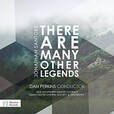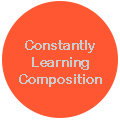The Return (Armistice Poems)
- For SATB chorus and piano (versions for SATB chorus/brass quintet/piano and SATB chorus/string quintet/piano also available); secular text from two WW I poets and Robert Louis Stevenson on the coming of peace
- Length: 7:00
- Difficulty rating (1-5): 4

Listen to excerpts from the Navona Records release There Are Many Other Legends, tracks 2, 3 and 4.
- View a PDF score excerpt
- Purchase, request full review copy or more information, etc.
- Score: $3 (for reproduction rights; minimum purchase of 10 required; additional charge for hard copies)
The Return (Armistice Poems) was commissioned and premiered by the New Hampshire Master Chorale, Dan Perkins, Music Director.
When the New Hampshire Master Chorale first approached me about writing a piece celebrating the end of war, I found myself thinking about World War I—the “Great War,” the “War to End All Wars”—the heroic deeds, great hopes, and ultimate tragedy of a conflict which is rapidly fading from living memory, and the parlor songs and marches which formed the musical background of that conflict. Two of the three texts I set deal specifically with WWI and the Armistice—from an English soldier in the trenches, and an American woman receiving news of war’s end far from the battlefields of Europe. The third text, contained in a larger work by Robert Louis Stevenson which predates the Armistice by some forty years, seems apt for a piece about the conclusion and aftermath of war, particularly as seen through the quickly-dimming lens of remembrance.
This work has been performed by the New Hampshire Master Chorale, and by the Proctor Academy Chamber Choir during a tour of Washington, D.C. area sites including Walter Reed Army Medical Center.
I. The Return
I heard the rumbling guns. I saw the smoke,
The unintelligible shock of hosts that still,
Far off, unseeing, strove and strove again;
And Beauty flying naked down the hill
From morn to eve: and the stern night cried Peace!
And shut the strife in darkness: all was still,
Then slowly crept a triumph on the dark--
And I heard Beauty singing up the hill.
—John Freeman
II. November 11, 1918
Suddenly bells and flags!
Suddenly—door to door--
Tidings! Can we believe,
We, who were used to war?
Yet we have dreamed her face,
Knowing her light must be,
Knowing that she must come.
Look—she comes, it is she!
Tattered her raiment floats,
Blood is upon her wings.
Ah, but her eyes are clear!
Ah, but her glad heart sings!
Soon where the shrapnel fell
Petals shall wake and stir.
Look—she is here, she lives!
Beauty has died for her.
—Agnes Lee
III. The Country of the Camisards
WE travelled in the print of olden wars,
Yet all the land was green,
And love we found, and peace,
Where fire and war had been.
They pass and smile, the children of the sword--
No more the sword they wield;
And O, how deep the corn
Along the battlefield!
—Robert Louis Stevenson
FROM THE PRESS
[The Boston Cecilia] Choir and string quintet offered a polished reading of Jonathan Santore’s The Return (Armistice Poems) (2005). Setting texts by John Freeman, Agnes Lee, and Robert Louis Stevenson, the composer sought to re-create World War I era parlor music, even as the settings resonate anew today. The work was lovely, and lovingly performed by all assembled . . . Bringing Santore . . . to new and very appreciative audiences was an unqualified success.
—Cashman Kerr Prince, The Boston Musical Intelligencer


